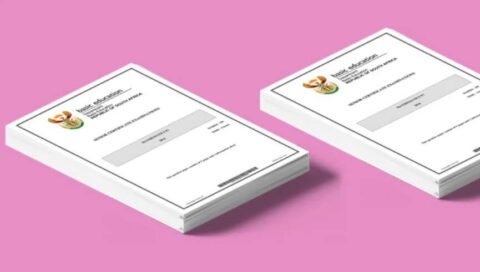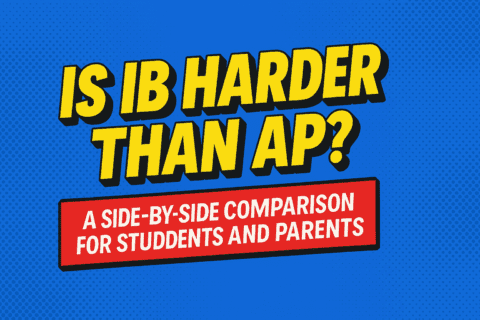I’ll be honest—I used to Google this question all the time in high school. If you’re reading this, I’m guessing you’re in the same boat: stuck choosing between AP and IB, or wondering if you made the “right” decision.
Let me save you some stress: colleges don’t have a blanket preference for AP or IB. But—(and this is a big BUT)—what they do care about is context, challenge, and consistency.
Now let’s unpack that in the most real, relatable, and research-backed way possible.
🎒 Chapter 1: The Dueling Titans of Advanced Academics
First, let’s set the stage.
AP (Advanced Placement)
U.S.-based
Run by the College Board (yes, the same people behind the SAT)
Students choose individual AP classes (e.g., AP Biology, AP U.S. History)
Culminates in an exam scored 1–5
IB (International Baccalaureate)
Global program born in Switzerland
Offers the IB Diploma Programme (IBDP) for grades 11–12
Structured program: six subject groups + Theory of Knowledge (TOK), Extended Essay (EE), and CAS (Creativity, Activity, Service)
Exams scored 1–7
On paper, both are college-level, rigorous, and highly respected.
But beneath the surface? They’re totally different beasts.
🎯 Chapter 2: What Do Colleges Really Want?
Let me give it to you straight: colleges want to see that you challenged yourself in the context of your school.
If your school offers IB? Great. If it only offers AP? Also great.
What matters is:
Did you take the hardest classes available to you?
Did you do well in them?
Did your choices reflect your academic interests and goals?
“We don’t prefer AP or IB—we just want students to pursue the most rigorous program offered at their school.” — Stanford Admissions
Boom. There it is.
📚 Chapter 3: Side-by-Side Comparison (Without the Jargon)
| Feature | AP | IB |
|---|---|---|
| Structure | Pick your own classes | Full 2-year diploma or individual courses |
| Depth | Content-heavy | Depth + global perspective |
| Style | Test-focused | Emphasizes writing, research, reflection |
| Flexibility | Highly customizable | Structured program with requirements |
| Recognition | Widely known in U.S. | Respected globally |
TL;DR:
AP = more freedom, more variety
IB = more holistic, more demanding
✏️ Chapter 4: The Workload Factor
Let me be real: IB is no joke.
If you’re doing the full IB Diploma, expect:
Internal Assessments
Extended Essay (think: 4,000-word research paper)
Group projects
Reflections
CAS hours (volunteering, extracurriculars)
Final exams
AP? Still hard, but more focused on:
Independent test prep
Less interdisciplinary connection
Optional essays (only on certain subjects)
My take?
IB will force you to grow in ways AP won’t—but AP gives you more room to breathe.
🧠 Chapter 5: Which One Do Colleges Respect More?
Colleges respect both. Period.
But here’s a nuanced take:
IB students often shine in liberal arts-style learning environments (think: discussion-based, writing-intensive, global focus)
AP students often dominate in specialized academic areas (e.g., math, science, CS)
“IB students tend to transition well into our curriculum, especially with their experience in critical thinking and writing.” — University of Michigan
“We value AP students who pursued depth in subjects related to their intended major.” — Georgia Tech
It’s not about which one. It’s about what you do with it.
🧩 Chapter 6: Pick What Fits You
Choose AP if:
You want to build a custom academic path
You’re strong in test-taking and independent learning
You want to take 1–2 advanced classes, not a full diploma
Your school doesn’t offer IB
Choose IB if:
You thrive in structured programs
You enjoy writing and research
You want a globally focused education
Your school offers a strong IB program with support
Choose Either If:
You’re ready to challenge yourself
You want college prep that goes beyond memorization
You’re building a narrative for your college app (e.g., “I love history + international politics” → IB fits. “I’m math-obsessed + into robotics” → AP could shine.)
🔥 Chapter 7: What About College Credit?
This is where AP can sometimes have the edge.
AP: Score a 4 or 5? You might skip intro college courses. Most U.S. schools have AP credit policies.
IB: Credit depends on Higher Level (HL) courses. Some colleges require a 6 or 7. Standard Level (SL) usually doesn’t count.
That said, some elite colleges don’t give credit for either. (Looking at you, Harvard.)
So credit is a bonus, not a guarantee.
🎓 Chapter 8: What If You’re Applying Internationally?
IB wins here. Straight up.
If you’re aiming for:
UK (e.g., Oxford, Cambridge)
Europe
Canada
Australia
…IB is recognized, respected, and often expected.
AP can still work—but IB is built for international admissions.
🧰 Chapter 9: How to Make Your Choice Look Intentional on Applications
Whatever you choose—OWN IT.
In your essays, interviews, and activities:
Connect your coursework to your passions
Reflect on what you’ve learned (beyond the grade)
Highlight how your academic choices prepared you for your intended major
The goal? Show that you didn’t just survive AP or IB—you used it.
💬 Chapter 10: FAQs You Were Probably About to Google
Can I take both AP and IB? Yes, but it’s rare—and a lot. Some schools let you take AP exams alongside IB classes.
What if my school only offers one? Colleges know. They only expect you to work with what’s offered.
Do IB scores matter more than AP scores? Nope. Both matter, but your grades in class and how you talk about them often count more than the exam scores alone.
✅ Final Verdict: So… Do Colleges Prefer AP or IB?
No. They prefer:
Academic rigor
Intellectual curiosity
Consistency
Performance
If that comes through AP, awesome. If that shines in IB, amazing.
What they don’t want is:
Burnout
Rigid perfectionism
A random pile of hard classes with no story
Take what challenges you. Then make it count.


